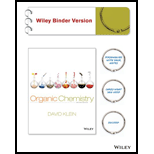
(a)
Interpretation:
The given molecule is D or L should be identified.
Concept introduction:
Monosaccharides: (single sugar unit) simple sugars units are the most basic units of carbohydrates.
Structure and nomenclature: Monosaccharide has this chemical formula:
Monosaccharides can be classified by the number x of carbon atoms. If they contain three carbon atom and is called triose. If they contain four carbon and is called tetrose, if they contain five carbon and is called pentose, if they contain six carbon and is called hexose and so on.
Aldose: A monosaccharide in which carbon serves as a backbone and contains an
Ketose: A ketose is a simple sugar unit (monosaccharide) containing one
D and L enantiomers: L isomers have the hydroxyl group attached to the left side of the asymmetric carbon furthest from the carbonyl.
R isomers have the hydroxyl group attached to the right side of the asymmetric carbon furthest from the carbonyl.
To find: Type of enantiomers.
(a)
Answer to Problem 42PP
Answer
The given compound is D-aldotetrose (a).

Explanation of Solution
The OH group connected to C3 is pointing to the right side, so it is called as D-sugar. The
(b)
Interpretation:
The given molecule is D or L should be identified.
Concept introduction:
Monosaccharides: (single sugar unit) simple sugars units are the most basic units of carbohydrates.
Structure and nomenclature: Monosaccharide has this chemical formula:
Monosaccharides can be classified by the number x of carbon atoms. If they contain three carbon atom and is called triose. If they contain four carbon and is called tetrose, if they contain five carbon and is called pentose, if they contain six carbon and is called hexose and so on.
Aldose: A monosaccharide in which carbon serves as a backbone and contains an aldehyde group at the beginning.
Ketose: A ketose is a simple sugar unit (monosaccharide) containing one ketone group per molecule.
D and L enantiomers: L isomers have the hydroxyl group attached to the left side of the asymmetric carbon furthest from the carbonyl.
R isomers have the hydroxyl group attached to the right side of the asymmetric carbon furthest from the carbonyl.
To find: Type of enantiomers.
(b)
Answer to Problem 42PP
Answer
The given compound is L-aldopentose (b).

Explanation of Solution
The given compound is L-aldopentose.
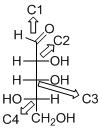
The OH group connected to C4 is pointing to the left side, so it is called as L-sugar. The functional group at Cl is an aldehyde group, so the compound is an aldose. Finally, the compound has five carbon atoms, so it is a pentose. The given compound is an L-aldopentose
(c)
Interpretation:
The given molecule is D or L should be identified.
Concept introduction:
Monosaccharides: (single sugar unit) simple sugars units are the most basic units of carbohydrates.
Structure and nomenclature: Monosaccharide has this chemical formula:
Monosaccharides can be classified by the number x of carbon atoms. If they contain three carbon atom and is called triose. If they contain four carbon and is called tetrose, if they contain five carbon and is called pentose, if they contain six carbon and is called hexose and so on.
Aldose: A monosaccharide in which carbon serves as a backbone and contains an aldehyde group at the beginning.
Ketose: A ketose is a simple sugar unit (monosaccharide) containing one ketone group per molecule.
D and L enantiomers: L isomers have the hydroxyl group attached to the left side of the asymmetric carbon furthest from the carbonyl.
R isomers have the hydroxyl group attached to the right side of the asymmetric carbon furthest from the carbonyl.
To find: Type of enantiomers.
(c)
Answer to Problem 42PP
Answer
The given compound is D-aldopentose (c).

Explanation of Solution
The given compound is D-aldopentose.
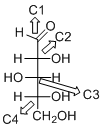
The OH group connected to C4 is pointing to the right side, so this is a D-sugar. The functional group at Cl is an aldehyde group, so the compound is an aldose. Finally, the compound has five carbon atoms, so it is a pentose. The given compound is a D-aldopentose.
(d)
Interpretation:
The given molecule is D or L should be identified.
Concept introduction:
Monosaccharides: (single sugar unit) simple sugars units are the most basic units of carbohydrates.
Structure and nomenclature: Monosaccharide has this chemical formula:
Monosaccharides can be classified by the number x of carbon atoms. If they contain three carbon atom and is called triose. If they contain four carbon and is called tetrose, if they contain five carbon and is called pentose, if they contain six carbon and is called hexose and so on.
Aldose: A monosaccharide in which carbon serves as a backbone and contains an aldehyde group at the beginning.
Ketose: A ketose is a simple sugar unit (monosaccharide) containing one ketone group per molecule.
D and L enantiomers: L isomers have the hydroxyl group attached to the left side of the asymmetric carbon furthest from the carbonyl.
R isomers have the hydroxyl group attached to the right side of the asymmetric carbon furthest from the carbonyl.
To find: Type of enantiomers.
(d)
Answer to Problem 42PP
Answer
The given compound is D-aldohexose (d).

Explanation of Solution
The given compound is D-aldohexose.
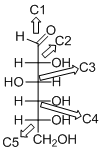
The OH group connected to C5 is pointing to the right side, so this is a D-sugar. The functional group at Cl is an aldehyde group, so the compound is an aldose. Finally, the compound has six carbon atoms, so it is called as a hexose. The given compound is a D-aldohexose
(e)
Interpretation:
The given molecule is D or L should be identified.
Concept introduction:
Monosaccharides: (single sugar unit) simple sugars units are the most basic units of carbohydrates.
Structure and nomenclature: Monosaccharide has this chemical formula:
Monosaccharides can be classified by the number x of carbon atoms. If they contain three carbon atom and is called triose. If they contain four carbon and is called tetrose, if they contain five carbon and is called pentose, if they contain six carbon and is called hexose and so on.
Aldose: A monosaccharide in which carbon serves as a backbone and contains an aldehyde group at the beginning.
Ketose: A ketose is a simple sugar unit (monosaccharide) containing one ketone group per molecule.
D and L enantiomers: L isomers have the hydroxyl group attached to the left side of the asymmetric carbon furthest from the carbonyl.
R isomers have the hydroxyl group attached to the right side of the asymmetric carbon furthest from the carbonyl.
To find: Type of enantiomers.
(e)
Answer to Problem 42PP
Answer
The given compound is D-ketopentose (e).

Explanation of Solution
The given compound is D-ketopentose.
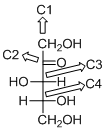
The OH group connected to C4 is pointing to the right side, so this is a D-sugar. The functional group at C2 is a ketone group, so the compound is a ketose. Finally, the compound has five carbon atoms, so it is a pentose. The given compound is a D-ketopentose.
Want to see more full solutions like this?
Chapter 24 Solutions
Organic Chemistry, Binder Ready Version
- Relative Abundance 20- Problems 501 (b) The infrared spectrum has a medium-intensity peak at about 1650 cm. There is also a C-H out-of-plane bending peak near 880 cm. 100- 80- 56 41 69 M(84) LL 15 20 25 30 35 55 60 65 70 75 80 85 90 m/zarrow_forwardPolyethylene furanoate is a polymer made from plant-based sources; it is used for packaging. Identify the monomer(s) used in the production of this polymer using a condensation process.arrow_forwardPhenol is the starting material for the synthesis of 2,3,4,5,6-pentachlorophenol, known al-ternatively as pentachlorophenol, or more simply as penta. At one time, penta was widely used as a wood preservative for decks, siding, and outdoor wood furniture. Draw the structural formula for pentachlorophenol and describe its synthesis from phenol.arrow_forward
- 12 Mass Spectrometry (d) This unknown contains oxygen, but it does not show any significant infrared absorption peaks above 3000 cm . 59 100- BO 40 Relative Abundance M(102) - 15 20 25 30 35 40 45 50 5 60 65 70 75 80 85 90 95 100 105 mizarrow_forwardDraw a Haworth projection of a common cyclic form of this monosaccharide: H HO H HO H HO H H -OH CH2OH Click and drag to start drawing a structure. Х : Darrow_forward: Draw the structure of valylasparagine, a dipeptide made from valine and asparagine, as it would appear at physiological pH. Click and drag to start drawing a structure. P Darrow_forward
- Draw the Haworth projection of α-L-mannose. You will find helpful information in the ALEKS Data resource. Click and drag to start drawing a structure. : ཊི Х Darrow_forwardDraw the structure of serine at pH 6.8. Click and drag to start drawing a structure. : d كarrow_forwardTake a look at this molecule, and then answer the questions in the table below it. CH2OH H H H OH OH OH CH2OH H H H H OH H H OH H OH Is this a reducing sugar? yes α β ロ→ロ no ☑ yes Does this molecule contain a glycosidic bond? If you said this molecule does contain a glycosidic bond, write the symbol describing it. O no 0+0 If you said this molecule does contain a glycosidic bond, write the common names (including anomer and enantiomer labels) of the molecules that would be released if that bond were hydrolyzed. If there's more than one molecule, separate each name with a comma. ☐arrow_forward
- Answer the questions in the table below about this molecule: H₂N-CH₂ -C—NH–CH–C—NH–CH—COO- CH3 CH CH3 What kind of molecule is this? 0= CH2 C If you said the molecule is a peptide, write a description of it using 3-letter codes separated ☐ by dashes. polysaccharide peptide amino acid phospolipid none of the above Хarrow_forwardDraw a Haworth projection of a common cyclic form of this monosaccharide: CH₂OH C=O HO H H -OH H OH CH₂OH Click and drag to start drawing a structure. : ☐ Х S '☐arrow_forwardNucleophilic Aromatic Substitution 22.30 Predict all possible products formed from the following nucleophilic substitution reactions. (a) (b) 9 1. NaOH 2. HCI, H₂O CI NH₁(!) +NaNH, -33°C 1. NaOH 2. HCl, H₂Oarrow_forward
 ChemistryChemistryISBN:9781305957404Author:Steven S. Zumdahl, Susan A. Zumdahl, Donald J. DeCostePublisher:Cengage Learning
ChemistryChemistryISBN:9781305957404Author:Steven S. Zumdahl, Susan A. Zumdahl, Donald J. DeCostePublisher:Cengage Learning ChemistryChemistryISBN:9781259911156Author:Raymond Chang Dr., Jason Overby ProfessorPublisher:McGraw-Hill Education
ChemistryChemistryISBN:9781259911156Author:Raymond Chang Dr., Jason Overby ProfessorPublisher:McGraw-Hill Education Principles of Instrumental AnalysisChemistryISBN:9781305577213Author:Douglas A. Skoog, F. James Holler, Stanley R. CrouchPublisher:Cengage Learning
Principles of Instrumental AnalysisChemistryISBN:9781305577213Author:Douglas A. Skoog, F. James Holler, Stanley R. CrouchPublisher:Cengage Learning Organic ChemistryChemistryISBN:9780078021558Author:Janice Gorzynski Smith Dr.Publisher:McGraw-Hill Education
Organic ChemistryChemistryISBN:9780078021558Author:Janice Gorzynski Smith Dr.Publisher:McGraw-Hill Education Chemistry: Principles and ReactionsChemistryISBN:9781305079373Author:William L. Masterton, Cecile N. HurleyPublisher:Cengage Learning
Chemistry: Principles and ReactionsChemistryISBN:9781305079373Author:William L. Masterton, Cecile N. HurleyPublisher:Cengage Learning Elementary Principles of Chemical Processes, Bind...ChemistryISBN:9781118431221Author:Richard M. Felder, Ronald W. Rousseau, Lisa G. BullardPublisher:WILEY
Elementary Principles of Chemical Processes, Bind...ChemistryISBN:9781118431221Author:Richard M. Felder, Ronald W. Rousseau, Lisa G. BullardPublisher:WILEY





